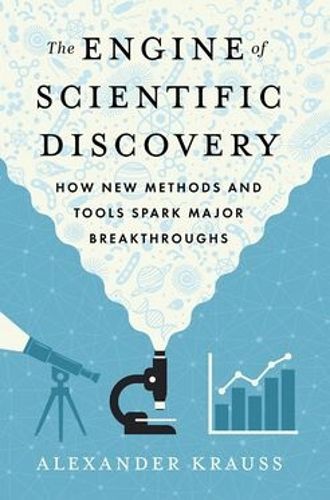Readings Newsletter
Become a Readings Member to make your shopping experience even easier.
Sign in or sign up for free!
You’re not far away from qualifying for FREE standard shipping within Australia
You’ve qualified for FREE standard shipping within Australia
The cart is loading…






How do we spark new scientific discoveries? How can we accelerate new breakthroughs in science? These are some of the biggest unsolved questions in science. Many believe that discoveries arise by chance or serendipity. The Engine of Scientific Discovery illustrates, for the first time, how we can actively speed up the pace of new breakthroughs by developing better methods and tools of discovery which enable us to see and think in entirely new ways. New tools are the lenses through which we discover what we often did not even know existed: improved microscopes uncovered microorganisms and viruses, x-ray methods exposed the structure of DNA, particle accelerators detected subatomic particles, and advanced telescopes revealed galaxies.
This book explores science's biggest discoveries--spanning all Nobel Prize discoveries and over 200 other major discoveries. The findings are striking: science's over 750 major discoveries have been triggered by first developing a new method or instrument that made the breakthrough possible. In fact, most discoveries are now uncovered within just a few years after designing the needed tool. This pattern reveals how our transformative new tools are The Engine of Scientific Discovery--a fundamental principle of scientific progress overlooked until now.
By shifting our attention to inventing new tools as the key to advancing new breakthroughs, we can spark a methodological revolution in science. Instead of waiting for breakthroughs, we can actively design and build new tools of discoveries. What if the next great breakthroughs depend not just on asking better questions, but developing better tools to ask and answer them--on entirely new ways of discovering? A new theory of discovery emerges, offering a roadmap for accelerating progress across science.
$9.00 standard shipping within Australia
FREE standard shipping within Australia for orders over $100.00
Express & International shipping calculated at checkout
Stock availability can be subject to change without notice. We recommend calling the shop or contacting our online team to check availability of low stock items. Please see our Shopping Online page for more details.
How do we spark new scientific discoveries? How can we accelerate new breakthroughs in science? These are some of the biggest unsolved questions in science. Many believe that discoveries arise by chance or serendipity. The Engine of Scientific Discovery illustrates, for the first time, how we can actively speed up the pace of new breakthroughs by developing better methods and tools of discovery which enable us to see and think in entirely new ways. New tools are the lenses through which we discover what we often did not even know existed: improved microscopes uncovered microorganisms and viruses, x-ray methods exposed the structure of DNA, particle accelerators detected subatomic particles, and advanced telescopes revealed galaxies.
This book explores science's biggest discoveries--spanning all Nobel Prize discoveries and over 200 other major discoveries. The findings are striking: science's over 750 major discoveries have been triggered by first developing a new method or instrument that made the breakthrough possible. In fact, most discoveries are now uncovered within just a few years after designing the needed tool. This pattern reveals how our transformative new tools are The Engine of Scientific Discovery--a fundamental principle of scientific progress overlooked until now.
By shifting our attention to inventing new tools as the key to advancing new breakthroughs, we can spark a methodological revolution in science. Instead of waiting for breakthroughs, we can actively design and build new tools of discoveries. What if the next great breakthroughs depend not just on asking better questions, but developing better tools to ask and answer them--on entirely new ways of discovering? A new theory of discovery emerges, offering a roadmap for accelerating progress across science.